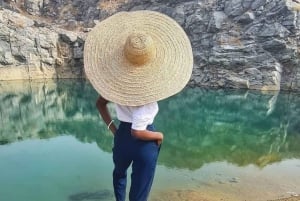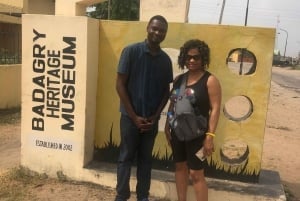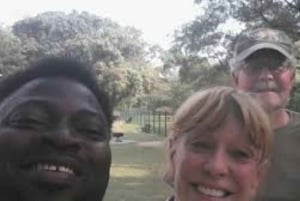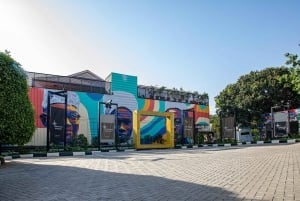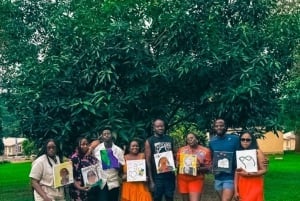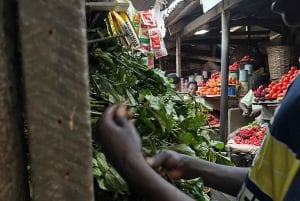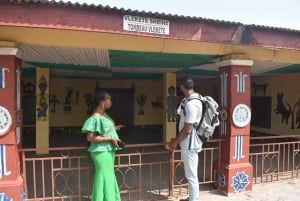South West Region
Your Local Guide to the South West Region of Nigeria

The south-west region of Nigeria offers a wide range of sights and experiences; from the beaches in Lagos to the natural springs in Osun state and from the historic city of Ibadan to the mountain caves of Ogun state.
South West Nigeria has six states; Ekiti, Lagos, Ogun, Ondo, Osun and Oyo. It is majorly a Yoruba speaking area, although there are different dialects even within the same state. The weather conditions vary between the two distinct seasons in Nigeria; the rainy season (March - November) and the dry season (November - February). The dry season is also the bringer of the Harmattan dust; cold dry winds from the northern deserts blow into the southern regions around this time.
Ekiti - Fountain of Knowledge

Ekiti is a state in western Nigeria and was created out of the Old Ondo in 1996. The state has 16 Local Government Areas, with its capital in Ado-Ekiti, Ekiti State is divided into four areas; Ekiti Central, Ekiti North, Ekiti South and Ekiti West. Ekiti was one of the many Nigerian states that was independent before the British came and introduced indirect rule. It is known as the 'Fountain of Knowledge', as it is reputed to have produced a good number of professors and several academic pioneers in Nigeria. The people of the state can trace its ancestry to Oduduwa, the father and ancestor of the Yoruba race. Ekiti people are one of the largest ethnic groups among the Yorubas, with an ancestry in the migrated people of Ile Ife. They speak English, Ekiti and other varying dialects. However, dialect varies across different locations.
Ekiti is an upland zone rising over 250 meters above sea level and it covers a total of 6,353 square kilometres of land. It is bordered by Ondo in the south and Kwara in the north. Kogi is to the east and Osun to the west. The state is dotted with rugged hills such as the Ikere-Ekiti hills in the south, Efon Alaaye hills in the west and Ado-Ekiti in the centre.
The major source of occupation and income in the state is agriculture. Agriculture provides income and employment for about 75% of the populace and they produce both food and cash crops. The food crops are: rice, yam, cassava, maize and cowpea while the cash crops are: cocoa, oil palm, kola nut, plantain, Banana, cashew, citrus and timber.
Important cities and towns in this state include:
Ado-Ekiti, Ikere, Efon, Ikole, Aramoko-Ekiti, Ode, Ijero, Ise, Ilawe, Omuo, Igede, Otun, Ido, Iye, Iyin, Aisegba, Emure, Ayedun, Okemesi, Ogotun, Odo-Oro, Afao, Erinmope and Oye-Ekiti.
Points of interest and things to do in Ekiti include:
Ikogosi Warm Spring, Ikogosi (warm spring over a hilly landscape at about seventy degrees and later forms a confluence with another cold spring from an adjoining hill). Orole Hills, Ikere Ekiti (myth has it that the hill was formerly a woman who was worshipped), Olosunta Hills, Ikere Ekiti (worshipped by the locals for seven days every year in a festivity during the month of August), Ewiâs Palace, Ado Ekiti (offers an opportunity for the visitors to learn more about cultural heritage of Ekiti people), Fajuyi Memorial Park (equipped with a fountain, watersport, games, children playground, tower, mini museum, restaurant and bar for visitors and tourists). Ero Dam & Lake (supplies some drinkable water to some of the local government areas of the state). Ipole-Iloro Waterfall (another scenic cascade set in forested hills and now has some recreational facilities). Erin Ayonigba Sacred Fish River, Erinjiyan-Ekiti (myth has it that a strange woman who migrated to the town metamorphosed into the river and that the fishes are her children). Oroke Ewo War Centre, Ilupeju Ekiti (preserved site of war between warriors from Ilorin led by their warlord). Osun River Source (worshipped by the people of Osogbo in Osun state with fun fair as a goddess that gives children). Ooni River, Efon Alaaye (believed to possess therapeutic power to cure guinea worm and other water borne diseases). Egbigbu Artificial Lake, Ayetoro-Ekiti (a beautiful scenery with various species of aquatic life such as catfish, shellfish, and reptiles). Esa Cave, Iyin-Ekiti (capable of holding about thirty-four thousand people at a time and is believed to have shielded the people of the town during the internecine wars in Yoruba land).
Lagos - Centre of Excellence

Lagos (meaning lakes) was created on May 27th, 1967 and consists of four islands; Lagos Island, Victoria Island, Ikoyi and Iddo . It has 57 local government areas, and was the capital of Nigeria until 1976. It is known as the 'centre of excellence', as it is the commercial nerve-centre of Nigeria, having more than half of its industrial investments. It is a Yoruba speaking, south-western state, but the population consists of people from all tribes in the country and many different nationalities. Lagos is known for its music, beaches, nightlife, parties and hard-working lifestyle. The slogan 'work all day, party all night' cannot be truly experienced anywhere else. Victoria Island is the main nightlife district in Lagos. Among its educational and cultural institutions are Moshood Abiola University, Yaba College of Technology, and the National Museum; the city also has a large, versatile sports stadium.
The old Yoruba town (beginning in the 15th century) grew as a trade center and seaport. From the 1820s until it became a British colony, Lagos was an infamous center for slave trade. From the late 19th century to 1960, Lagos was the center of the Nigerian Nationalist Movement. Lagos was the capital of Nigeria from independence until 1991, when the capital was moved to Abuja.
Major cities of Lagos include Lagos, Ikeja, Lekki, Ikorodu, Eko Atlantic, Badagry, Epe, Ojo, and many others. The best hotels are Southern Sun Ikoyi, Radisson Blu Anchorage, Protea Hotel Ikeja, Four Points by Sheraton, InterContinental Lagos, Ibis Lagos Airport, Lilygate Hotel, The Moorhouse Ikoyi Lagos, Federal Palace Hotel, The Avenue Suites, etc.
Points of interest and things to do in Lagos include:
National Arts Theatre (a multi-purpose national monument for the preservation, presentation and promotion of Nigerian arts and culture).
Whispering Palms Beach Resort, Badagry Lagos (a conference resort centre that typifies the beauty of the areaâs cool Atlantic breeze, sillica sands, palm trees and chirping birds, Inagbe Grand Resorts and Leisure (built on the tranquil banks of the magnificent Lagos Lagoon and the Atlantic Ocean), Funtopia Water Park (a new indoor and outdoor state-of-the-art entertainment and recreational centre), National Museum Lagos (contains great collections in archaeology, ethnography and traditional artefacts). Badagry Black Heritage Museum (built as early as 1863). Eleko Beach Lagos (a palm-fringed beach with several small privately owned beach huts). Terra Kulture (a privately owned educational and recreational centre). The Freedom Park (located on the spot of the colonial prison where prominent Nigerians received their jail terms during the colonial era), Lacampagne Tropicana Beach Resort (a tranquil paradise which offers a unique blend of natural environments).
Ogun - Gateway State

Ogun was created in 1976 with Abeokuta as the capital. Abeokuta means 'under the stone'. Also known as the 'gateway state' because of its strategic position as the link by road, rail, air and sea to the rest of the country, its towns of importance Sagamu, Ijebu Ode and Ilaro served as markets during the mining industry's better times and still do today. Ogun state comprises of varying dialects of the Yoruba language; the Egbas, the Egbados, the Ijebus, the Remos. Ogun deals in traditional arts, carving, sculpture, smithery amongst others. The state covers a landmass of 16,409sqkm, and it shares an international boundary with the Republic of Benin to the west and interstate boundaries with Oyo state to the north, Lagos and the Atlantic to the south and Ondo state to the east.
Important cities and towns include Abeokuta, Ijebu-Ode, Sagamu, Ikenne Remo, Ilaro, Ijebu-Igbo, Aiyetoro etc.
Points of interest and things to do in Ogun include:
St. Peters Cathedral (which is the first ever church to be built in Nigeria by the missionaries), Ojude Oba Festival (celebrated to honour the traditional ruler and is one of the biggest festivals in West Africa), Sungboâs Eredo (a 100-mile-long wall whose construction began a millennium ago). Abeokuta Central Mosque, Ebute Oni Tourist Beach Resort, Alake Palace, Olowu Palace, Lisabi Sacred Forest, Itoku Market, Omo Forest Reserve, Hill Top Golf Resort, Saam Health Farm and Holiday Resort, Abeokuta Museum, Abeokuta, Madam Tinubu Shrine, Osuuru Spring Water, Imeko, Egungun Festivals, Centenary Hall, Ake Abeokuta, Olumo Rock in Abeokuta, Bilikisu Sungbo Shrine in Oke-Eri, Yemoji Natural Swimming Pool in Ijebu-Ode, Oyan Dam in Abeokuta North, Iwopin Boat Regatta and Ebute-Oni in Ogun Waterside.
Ondo - Sunshine State

Ondo popularly referred to as the "Sunshine State" was created on the 3rd of February 1976 from the former Western State of Nigeria. It has 19 local government areas and originally included what is now Ekiti state, which was founded in 1996 by General Sanni Abacha. Its capital is Akure. There are numerous dialects of Yoruba spoken in Ondo state (Akoko, Akure, Apoi, Idanre, Ijaw, Ikale, Ilaje, Ondo and the Owo).
Ondo is blessed with resourceful, industrious and hospitable people. The state boasts subsistence farmers, fishermen and traders as well as a seasoned crop of educated elite which led to its classification as one of the most educationally advanced states in Nigeria. The lifestyle of the people includes energetic dancing, the production of clothes, wood crafts, carved house-posts, decorated doors etc. Antiquities and artefacts have also been preserved and are displayed in traditional palaces. Ondo, with a land mass of 14,789sqkm, is larger than Connecticut and only just smaller than Hawaii. It has an estimated population of 3,441,024. It lies geographically on the tropical belt and is bordered in the north by Ekiti and Kogi; east by Edo state; west by Oyo and Ogun and in the south by the Atlantic Ocean.
Ondo has a network of several rivers, creeks and lakes in and around the state with very notable rivers such as Owena, ala, Oluwa, Oni, Awara, Ogbese and Ose.
Some important cities and towns are:
Akure, Owo, Ore, Ondo, Oka-Akoko, Okitipupa, Ile-Oluji, and Ikare.
Points of interest and things to do in Ogun include:
Idanre Hills (one of the most beautiful natural landscapes in Ondo State and Nigeria)., Owo Museum of Antiques (has many wood and ivory carvings, brass and bronze works etc.), Deji of Akure Palace (houses a large number of historical monuments relating to the establishment of Akure), Egungun (Masquerade) Festival, Cave Ashes, Isharun (believed to be where the skeleton of the oldest pre-historic man was exhumed by Professor Thurstan Shaw), Ebomi Lake Tourist Centre, Igbokoda Waterfront (is one of the longest territorial water in Nigeria, with a fascinating fishing terminal). Igbo Olodumare (is a thick evergreen forest significant for its spiritual value). Olowoâs Palace, Owo (which is the largest palace in Yoruba land containing over 100 ancient courtyard)
Osun - State of Living Spring

Osun is an inland state with Osogbo as its capital city. The people of Osun are hospitable and very industrious, involved in all sorts of trades. Osun has 30 Local Government Areas with over 200 towns and is divided into three federal senatorial districts. The state was created in 1991 from Oyo state, and got its name from the River Osun; a natural spring that is said to be the manifestation of the Yoruba goddess Osun. It is known as the 'state of living spring'.
Here you will find mostly traders, artisans and farmers, producing hand woven textiles, leather-work, and woven mats. Osun State has territorial boundaries in the West by Oyo State, Ondo and Ekiti States in the East, Kwara State in the North and Ogun in the South. The State operates an agrarian economy with a vast majority of the populace farmers.
Notable among the cities and towns are Oke-Ila Orangun, Ila Orangun, Ede, Iwo, Ejigbo, Esa-Oke, Ilobu and Ilesa.
Points of interest and things to do in Osun include:
There is an annual Osun Osogbo festival during August, held along the river banks, with annual rites performed at the Osun Osogbo grove attracting visitors from around the world. The Osun Osogbo grove was declared a UNESCO World Heritage Site in 2005. Another notable festival is the Osun Cultural Festival.
Oluminrin Waterfalls, Erin-Ijesha (has about seven with water flowing among the rocks and splashing down with forcibly to the evergreen vegetation). Ooniâs Palace Enuwa, Ile-Ife, Ife Museum, Enuwa Square, Ile-Ife (bronzes and terracotta sculptures dating back to the 13th century). Obafemi Awolowo University, Ile Ife (has a magnificent architectural structure, sports field, botanical garden and an amphitheatre).
Oranmiyan Staff (Opa Oranmiyan) (a historic staff erected with a 5.18m stone column and is about 4-feet square at the base). Osogbo Arts and Metal Works (metals are masterfully crafted and shaped to make valuable itemsâ among them are Nike Arts, Twin Seven Seven andJimoh Braimoh). Ataoja Royal Palace (has a museum where all the historical facts about the establishment of the city are preserved).
Museum of Arts (one of the best museum of arts in Nigeria portrays the Yoruba cultural heritage). African Heritage Gallery, Okonfo Rao Kawawa, Suzanne Wengerâs House and Centre, Nike Centre for Arts & Culture, Genesis Gallery, Osogbo, MicCom Golf Hotels and Resort, Ada
Other sites of interest are, The Mbari-Mbayo Heritage, The Palace of Owa Obokun of Ijeshaland, Idi-Baba Cultural Centre, Adunni Susan Wengerâs Art Works Center, Osogbo, Erinle Shrine at Olobu Palace, Ilobu, Mat Weaving, Ipetu-Ilesha, Obalufon Shrine, Ifon-Oshun, St. Joseph Workshop and Craft Centre, Inisha, Oja Oba Market, Osogbo, Atamora Rock Scenery, Iwo, Ayinkunkun nigba Waterfall, Oke-Ila, Kiriji War Site, Igbajo, Timi of Edeâs Palace, Ede
Oyo - Pace Setter State

Oyo is in the south-west of Nigeria and it was among the 3 states carved out of the former Western State of Nigeria in 1976. The state has 33 Local Government Areas and is known as the 'Pace Setter State'. Ibadan, the capital and most important city, is the third largest metropolitan area (by population) in Nigeria after Lagos and Kano. Oyo has five broad group divisions; Ibadans, Ibarapas, Oyos, Oke-Ogubs and Ogbomoshos. Oyo enjoys a similar dual climate condition to the rest of the south-western states, with a rainy season and a dry season. The climate is ideal for the cultivation of crops like maize, yam, cassava, millet, rice, plantain and cashew.
Oyo State covers a total of 28, 249 square kilometres of land mass and it consists of old hard rocks and dome-shaped hills. A remarkable natural feature in the state is the Old Oyo National Park.
Apart from Ibadan, other important places are Oyo, Iseyin, Ogbomoso, Okeho, Saki, Igboho, Kisi, Igbo-Ora, Lalupon, Fiditi, Ilora, and Eruwa.
Points of interest and things to do in Oyo include:
The University of Ibadan (the first premier university of Nigeria established in 1948) Zoological Garden, University of Ibadan (one of the prominent zoological garden in Nigeria with a wide variety of animals).
The Botanical Garden, University of Ibadan: (has several species of plants which are grown for a calm environment).
Nigerian Television Authority (NTA), Ibadan (the oldest television station in Africa and serves as a journalism museum).
The National Museum of Unity, Dugbe (displays musical instruments used by various tribes in Nigeria).
Cocoa House, Ibadan (the first skyscraper built in Africa and was constructed from the proceeds of cocoa sold for export).
Agodi Gardens, Ibadan (unique for a perfect blend of its nursery, arboretum, park and zoo blend)
Game World, Dugbe Game world is (a recreational centre for various indoor games, contains a restaurant, a conference centre and a minibar).
Old Oyo National Park (with a land area of about 2,500 square kilometres and harbours a wide range of wildlife).
IITA Forest (has many sporting facilities and is a place for bird-watching).
Cultural Centre (displays the cultural heritage of the Yoruba people).
Irefin Palace, Ibadan (built 200 years ago with mud and contains 185 rooms).
Mapo Hall (colonial edifice with outstanding pillars and sophisticated architectural design).



